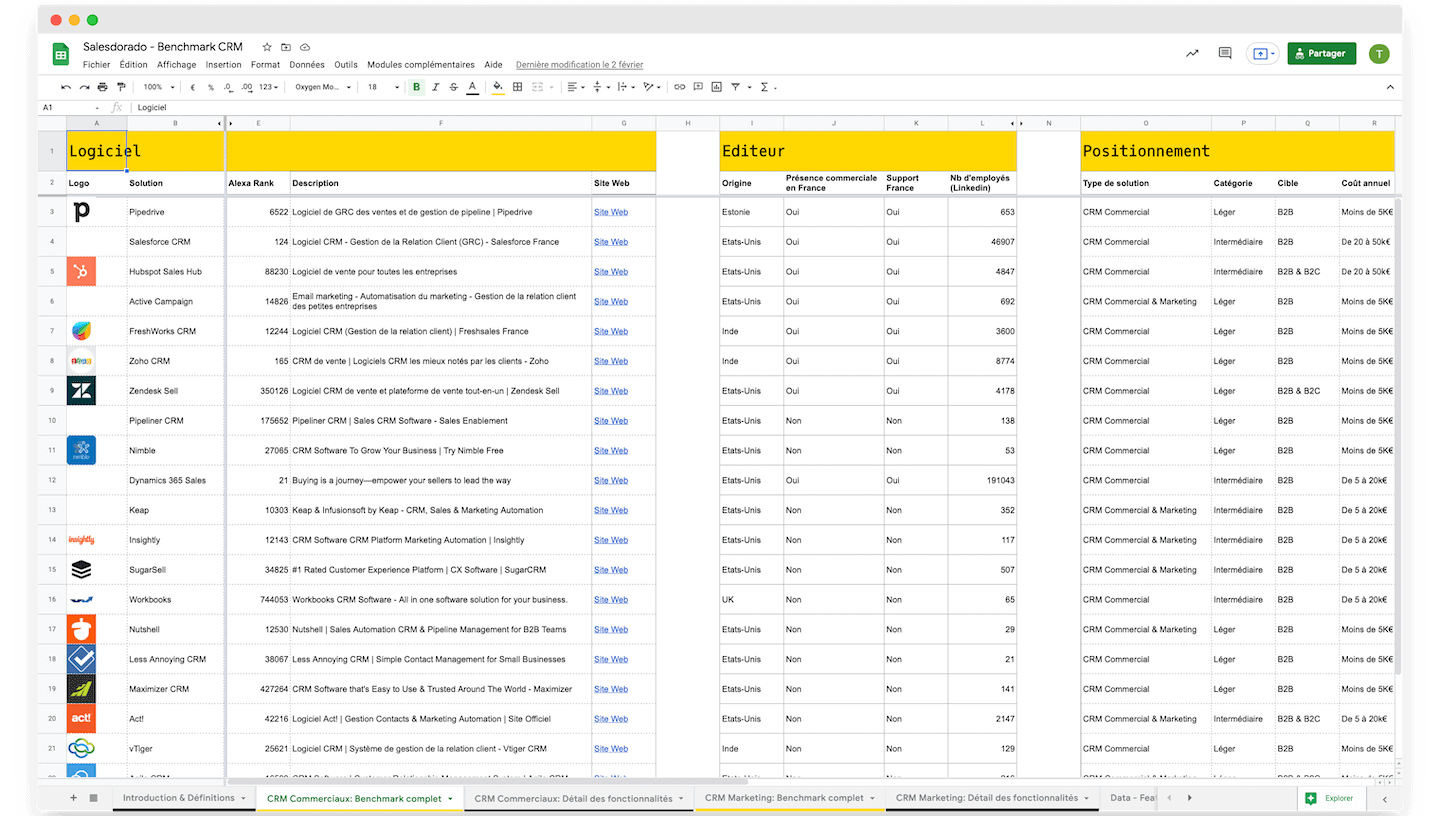The role of data in marketing is sufficiently discussed here and there and well known that it does not need to be repeated. “How to better exploit data to improve marketing performance and make better decisions? This is undoubtedly one of the main questions that companies are asking themselves today, in B2B as well as in B2C.
But in this guide, we will look at data from a specific angle: data quality. This is an increasingly hot topic: Data Quality. In data management, as in many other areas, quality is more important than quantity. What are we talking about? What does the term Data Quality cover? Why is maintaining data quality a crucial issue? How can data quality be managed in an organisation? How do you simply maintain a quality database with up-to-date data? These are all important topics that merited a complete dossier on the subject, and here is the first article.
Sommaire
What is Data Quality? [Definition]
Data Quality refers to the ability of a company to maintain the sustainability of its data over time, and thus its usability in marketing and sales operations. Data Quality therefore refers to a way of managing data in such a way that it remains viable over time. It is well known that time naturally erodes / degrades the quality of data, because customer data is a living thing: people change email addresses, addresses, telephone numbers, but also preferences, purchasing behaviour, etc. A database that is not maintained ends up storing data that is no longer accurate, that no longer corresponds to any reality. Data Quality Management is the set of practices and techniques that allow you to maintain the veracity of the data contained in your customer or prospect files.
However, data quality management covers a wider field and is based on the consideration of six dimensions or criteria, as identified by DAMA United Kingdom:
- Data completeness: do you have all the data you need on your customers or prospects? Are all the attributes/fields you need filled in? Incompleteness of available data is one of the main challenges faced by organisations in their database management.
- Validity: does the data available conform to a standard syntax? (e.g. “av” vs “avenue”).
- Their accuracy: quite simply, is the data in your database correct? Does it reflect reality? Data may well be complete and yet incorrect, so this criterion is essential. For example, you may have the addresses of all the individuals on your list, but only 70% of these addresses may be valid.
- Consistency: are the data in your different databases consistent with each other? Is the information for the same individual registered in several databases the same from one database to another?
- Availability of data: is the data easily accessible by the people who need it in their work?
- Timeliness of data: when was the data recorded or updated? This comes back to what we were saying earlier: data naturally loses value over time, it degrades. The more recent a piece of data is, all other things being equal, the more valuable it is.
The quality of the data available is the basis for effective marketing and sales activities. It is often said that data is the fuel for customer relations, commercial dialogue and marketing efficiency. But this is only true if the data is of good quality, in the multiple senses we have just listed.
Find out how to build a Lead Scoring strategy.
Why is inaccurate data dangerous data?
In the data analysis business, maintaining data quality is a key issue. All organisations that do Big Data know the risks and dangers of incorrect data. The concept of Data Quality is not just another buzzword, it is something really important, which describes a highly legitimate concern. However, it is clear that data quality is rarely a top priority for companies.
However, data as such is not enough on its own. What enables a company to improve its performance is not data as such, but quality data. Let’s put it bluntly: if you’re not prepared to maintain your data, you might as well not collect any data at all… We could even invent a slogan: data is either maintained or worthless. An infographic shared by Halo Business Intelligence showed that almost 40% of the data held by companies is inaccurate…Even more worrying, over 90% of companies admit that the customer data they hold is inaccurate…In the Halo Business Intelligence study, 66% of companies surveyed admit the possibility of incorrect data having a negative impact on their business. They even estimate the likely cost at an average of $8,200,000…Granted, we’re dealing with some big fish here, but still.
Discover .
Why and how does having poor quality data affect business performance to such an extent? The dangers associated with poor quality data are twofold. On the one hand, they lead to financial costs, on the other hand they damage the reputation of the company.
As the above study shows, accurate data has a financial impact/cost first. Without Data Quality, you are forced to make decisions and implement strategies based on inaccurate facts. Let’s take a simple yet mundane example. Let’s say you want to create your next marketing campaign. You use the data you have to target the right people. But if your data is wrong, you will target the wrong people with the wrong offers. You will have based yourself on assumed behaviours that are not those of your contacts. Your marketing campaign will have failed. It will have cost you money, with no consistent return on investment. Apart from that, having inaccurate data creates significant operational costs. If you have imprecise or inaccurate data on your customers, you will have to spend time trying to find the right information. And in business, time is money…
Of course, implementing data quality management costs money and requires an investment by the company. Initially, you will feel that you are losing more than you are gaining. But always remember, if in doubt, that the cost associated with poor quality data will always be higher than any data quality strategy. Fixing errors, related to poor data quality, is always more expensive in the end than limiting the risk of error… In this regard, let’s point out a study, admittedly quite academic, but nonetheless fascinating from 2011, which demonstrates with evidence that the costs associated with incorrect data is always higher than the costs associated with maintaining data quality.
Finally, as mentioned above, poor quality data can also have a very damaging impact on the company’s brand image. Because, quite simply, poor data quality necessarily impacts the quality of your communications, the quality of the dialogue you have with your customers. And then, to put it crudely, it’s bad form to show your customers, through your messages, that you have completely false information about them. This inevitably affects your credibility. This is true in B2C, but even more so in B2B.
Discover 10 major trends in the world of B2B CRM software.
The benefits of data quality management
Not taking care of data quality can have serious consequences on the company’s activity. But beyond this aspect, implementing data quality management has several “positive” benefits. First of all, it allows an organisation to reduce costs in different departments. The Halo Business Intelligence study showed that organisations that managed data quality managed to reduce :
- 10% to 20% of business expenditure
- 40% to 50% reduction in IT costs
- 40% reduction in operational costs
Again, most of these cost reductions are the result of using data more effectively. Planning, decisions and actions are more effective when they are driven by the right data. But data quality management also contributes directly or indirectly to improving economic performance (turnover, income). Because having good data helps to avoid big strategic mistakes, to improve the brand image and to guarantee customer loyalty. Using accurate data improves the performance of your marketing campaigns and sales strategy.
Above all, data quality management improves risk management. The risk of error is greatly reduced if you base your decisions on correct information. Data Quality helps to reduce the risk of error in many activities, from customer service to product development and even accounting! Having good data makes employees’ lives easier and more efficient. They no longer have to double-check the information every time to make sure it is valid.
Find out how to evolve B2B sales processes to meet the demands of the modern decision maker.
The key components of effective data quality management
How to put your data in order? How can you set up an efficient data quality management system? There are different approaches. First, your company must clearly formulate its needs and objectives with regard to the use of data.
There are three key components to consider in data quality management:
- Data governance
- Data Quality Assurance (QA)
- Data Quality Control
#1 Data governance
All companies should have a data governance team to oversee the quality of the data, its maintenance, the procedures in place to maintain quality. It has become common in recent years for companies to have a Chief Data Officer (CDO) responsible for keeping management informed of data-related issues facing the company.
A data management team must focus on the strategic objectives of the company. It must constantly ask itself what the company’s key objectives are and how to achieve them. The answers to this question help to define the data that the company needs to develop. It also helps to prioritise data quality objectives.
Once you have defined your business objectives in terms of data, you need to get the database in order. Several data quality programmes can be deployed for this purpose. It is also possible to outsource the cleaning of your databases, using a consultancy firm that is an expert in customer data. The most important thing is to focus on the data that really makes sense for your organisation and the pursuit of its goals, and to remove unnecessary or irrelevant data. Companies often find it difficult to delete data, but effective data quality management means focusing exclusively on essential data.
Be aware that data quality management is not just about implementing your action plan using sophisticated methods. You also need to be able to make trade-offs between the cost of implementing data quality programmes and the financial and reputational costs associated with using poor quality data. Data quality management, to be efficient, does not necessarily have to be expensive.
There is one last aspect of data governance that should not be overlooked. As we know, it is mostly human error that causes incorrect data. It is therefore also essential to make employees aware of the importance of data quality. Everyone in the organisation must be involved and understand why data quality is important. This awareness raising can be much more effective in removing incorrect data than implementing sophisticated new software.
Check out our Top 10 email list cleaning tools.
#2 Data Quality Assurance
Data Quality Assurance refers to the set of daily processes and techniques that enable the identification of inaccurate, inconsistent or incomplete data and thus ultimately guarantee the maintenance of data quality over time.
Implementing a Data Quality Assurance process ensures that the data used by the company is of a high quality on a daily basis and that the objectives identified by the data governance team are achieved.
#3 Data Quality Control
Finally, you should also implement data quality control protocols. Quality control takes over from Data Quality Assurance. Data Quality Control is about ensuring that the data is accurate and that the databases are not cluttered with unnecessary data. It is a question of controlling both the quality of the data and the use made of it by the company’s employees.
Data Quality Assurance measures the level of inconsistency, incompleteness and accuracy of the data available. The data control process consists of deciding whether the data is useful, relevant and worth exploiting. Let’s take an example. The person in charge of Data Quality Assurance will be the one to identify inconsistent data. The person responsible for control will be the one who decides to delete this data so that it is not used by the company. Their role is to prevent the organisation from using incorrect data.
Discover our complete guide to theart of setting up effective sales processes.
Conclusion
Data is an essential material for B2B companies. But data is only valuable if it is correct, complete, consistent, accurate and up-to-date. Poor quality data can have a negative impact on the business. Hence the interest in implementing data quality management within the organisation. But instead of simply implementing costly and time-consuming data quality programmes, companies should first take care to identify the use cases for their data. Data Quality is also the art of identifying relevant data and removing all other data.






